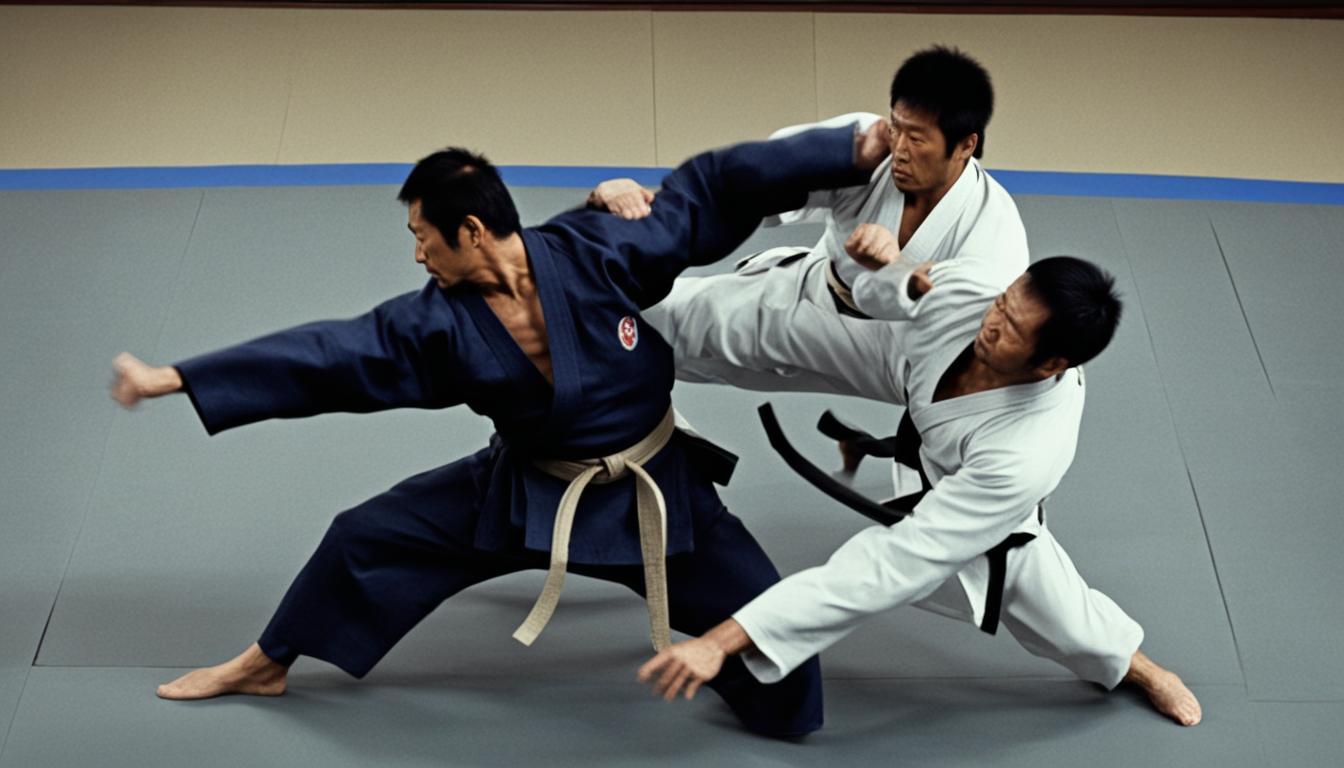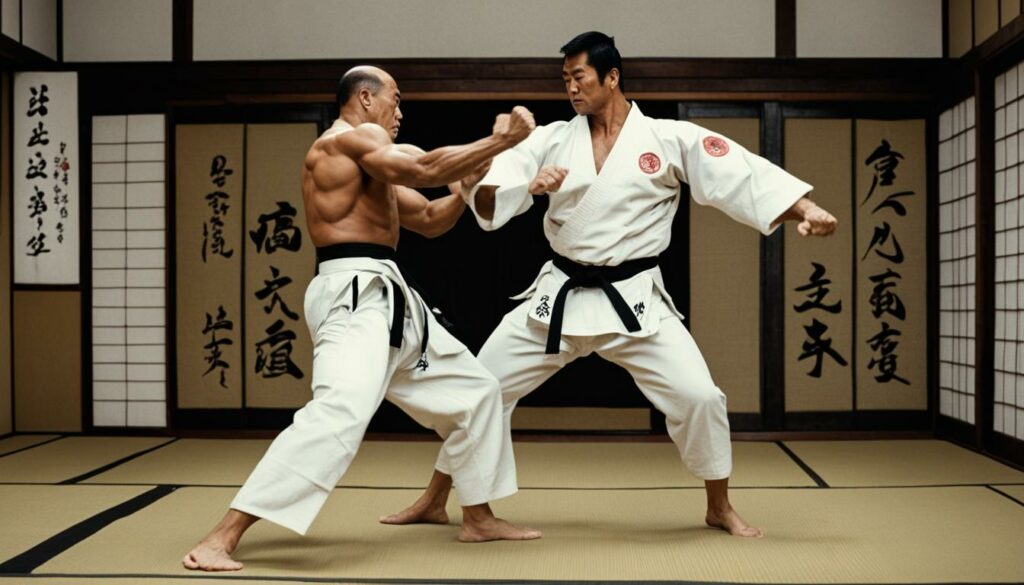When it comes to traditional martial arts, Japanese jujutsu holds a special place in history. Originating from the skilled samurai class in Japan, this ancient martial art has evolved over centuries to become a renowned form of self-defense and grappling techniques. Today, Japanese jujutsu, also known as jiu-jitsu, continues to captivate martial arts enthusiasts with its rich heritage and effective techniques.
Japanese jujutsu encompasses a wide range of techniques that emphasize leverage, joint locks, and throws. The art focuses on redirecting an opponent’s energy and using their body weight against them, making it suitable for practitioners of all ages and sizes.
In this section, we will explore the fascinating history of Japanese jujutsu and its significance as a traditional martial art. We will delve into the various jujutsu techniques and the role of grappling in this art form. Whether you are interested in self-defense or seeking to master a traditional martial art, Japanese jujutsu offers a comprehensive training experience that combines physical fitness, mental discipline, and personal growth.
Key Takeaways:
- Japanese jujutsu, derived from the elite samurai class, is an ancient martial art that focuses on self-defense and grappling techniques.
- Japanese jujutsu techniques utilize leverage, joint locks, and throws to redirect an opponent’s energy.
- Practitioners of Japanese jujutsu gain physical fitness, mental discipline, and personal growth through their training.
- The art form is suitable for individuals of all ages and sizes, providing practical self-defense skills.
- Exploring the art of Japanese jujutsu offers a unique opportunity to immerse oneself in a rich cultural heritage and discover the path to mastery.
The History and Philosophy of Dojo Japanese
The term “dojo” originated in 15th century Japan and was initially used to refer to a place of learning or meditation. It wasn’t until the 19th century that it became associated with martial arts training. Jigoro Kano, the founder of judo, established the first modern dojo in 1882.
In traditional Japanese dojo, the philosophy of Dojo Japanese is deeply rooted in the concept of “budo” or “the way of the warrior.” It encompasses more than just physical training, focusing on mental and spiritual development as well.
“Do not think of your training as mere aerobic exercise, or strictly as a means of self-defense; your dojo is a laboratory for the forging of your spirit. It is a place where you confront your weaknesses and learn to overcome them.”
Dojo Japanese embodies the holistic approach of traditional martial arts and emphasizes the unity of mind, body, and spirit. It seeks to cultivate discipline, respect, and self-control along with physical skills.
Through rigorous training and the guidance of experienced instructors, students of dojo Japanese not only learn practical self-defense techniques but also develop mental fortitude, resilience, and a sense of inner peace. The training becomes a journey of personal growth and self-discovery.
The Role of Tradition in Dojo Japanese
In traditional Japanese dojo, there is a profound reverence for preserving centuries-old traditions and passing down time-honored training methods and techniques. This commitment to tradition is what makes dojo Japanese such a rich and authentic martial arts experience.
One of the distinctive aspects of dojo Japanese is the use of traditional Japanese weapons, which adds a cultural and historical dimension to the training. Weapons like the katana (samurai sword) and bo staff are integral to the practice, allowing students to connect with the martial arts heritage of Japan and embody the spirit of the samurai.
History plays a crucial role in dojo Japanese, as it helps students gain a deep sense of respect and appreciation for the art form. By tracing the origins of the techniques and understanding their evolution over time, practitioners develop a profound understanding of the martial arts and their cultural significance.
Moreover, embracing tradition in dojo Japanese extends beyond the physical aspects of training. It encompasses a deepened understanding and appreciation of Japanese culture, instilling values such as discipline, honor, and harmony. By fostering a connection to cultural heritage, traditional dojo training becomes a holistic experience that goes beyond mere physical self-defense.
Training Methods and Techniques in Dojo Japanese
In traditional dojo, training methods are carefully designed to strengthen both the body and mind. Techniques are taught step-by-step, ensuring a solid foundation and gradual progression in skill level. Through repetitive practice of techniques like throws, joint locks, and strikes, students develop muscle memory, coordination, and reflexes.
The training curriculum in dojo Japanese typically consists of both individual and partner exercises. This allows students to develop their skills through solo practice as well as apply them in controlled sparring situations. Partner drills foster trust, timing, and adaptability, essential qualities for real-world self-defense situations.
The Cultural Connection of Traditional Dojo Training
Traditional dojo training forms a vital link to Japan’s rich cultural heritage. It serves as a conduit for transmitting not just martial arts techniques but also the values, philosophies, and customs that have shaped Japanese society for centuries.
By immersing themselves in traditional dojo Japanese, practitioners develop a profound appreciation for Japan’s history, art, and traditions. The rhythmic movements, etiquette, and rituals within the dojo create a unique atmosphere that promotes mindfulness, self-discovery, and personal growth.
Furthermore, in traditional Japanese dojo, instructors often share stories and anecdotes that connect the martial arts training to Japanese folklore and historical events. This deepens the understanding of the art and cultivates a sense of cultural connection.
Img src=”https://seowriting.ai/32_6.png” alt=”traditional Japanese dojo” align=”center”>
The Benefits of Training in a Traditional Japanese Dojo
Training in a traditional Japanese dojo offers numerous benefits, both physical and mental. The practice of dojo Japanese not only enhances physical fitness but also cultivates self-defense skills, promotes mental well-being, and fosters emotional well-being. Additionally, it creates a sense of community among practitioners, fostering camaraderie and a supportive environment. Let’s explore these benefits in detail:
Physical Fitness
Training in a traditional Japanese dojo provides an excellent way to improve physical fitness. The rigorous training sessions, which often include cardiovascular exercises, strength training, and flexibility exercises, help develop strength, endurance, and agility. This improves overall physical health and enhances physical performance in daily activities.
Self-Defense Skills
A core aspect of dojo Japanese is the practical self-defense skills that students acquire through dedicated training. The martial arts techniques taught in traditional dojos empower individuals with the ability to defend themselves effectively in real-world situations. Learning self-defense techniques boosts self-confidence, instills a sense of security, and provides the skills necessary to protect oneself and others.
Mental Well-Being
Training in a traditional Japanese dojo has significant benefits for mental well-being. The focus and discipline required during training sessions improve concentration and mindfulness, leading to reduced stress levels. Additionally, the practice of dojo Japanese cultivates mental resilience and fortitude, enabling practitioners to overcome challenges, both on and off the training mat.
Emotional Well-Being
Emotional well-being is a crucial aspect that dojo Japanese addresses. The practice of martial arts fosters emotional balance and self-control. It helps individuals channel their emotions in a healthy and constructive manner, promoting emotional well-being and stability. The discipline and self-reflection encouraged in traditional dojos also contribute to personal growth and self-awareness.
Sense of Community
Training in a traditional Japanese dojo creates a strong sense of community and camaraderie among practitioners. The dojo becomes a supportive environment where individuals with a shared passion for martial arts come together. The bonds formed in such communities provide a support system, encouraging personal growth, and fostering lasting friendships.
Embrace the physical, mental, and emotional benefits of training in a traditional Japanese dojo. Experience the perfect blend of physical fitness, self-defense skills, mental well-being, emotional well-being, and a sense of community in the world of dojo Japanese.
| Benefits | Details |
|---|---|
| Physical Fitness | Improved strength, flexibility, and coordination |
| Self-Defense Skills | Boosted confidence and sense of security |
| Mental Well-Being | Improved concentration, reduced stress, and personal resilience |
| Emotional Well-Being | Enhanced emotional balance and self-control |
| Sense of Community | Fostered camaraderie and supportive environment |
Conclusion
In conclusion, the traditional Japanese dojo offers a captivating and enriching martial arts training experience. By immersing ourselves in the study of dojo Japanese, we embark on a profound journey of self-discovery and personal growth. The combination of intricate techniques, deep-rooted philosophy, and a rich historical background provides a holistic approach to physical fitness, mental well-being, and community building.
By seeking out a reputable and traditional dojo, we have the opportunity to explore the teachings and philosophy of dojo Japanese in depth, gaining a profound understanding of this art form. Whether our purpose is to learn self-defense or to adopt a way of life, the traditional Japanese dojo serves as a transformative platform for mastery and personal development.
Within the walls of a traditional dojo, we not only strengthen our bodies but also nourish our minds and spirits. The martial arts training offered in the dojo challenges us to push our physical boundaries, enhancing our strength, flexibility, and coordination. Simultaneously, the mental discipline required throughout our training journey cultivates focus, concentration, and stress reduction.
Moreover, the dojo fosters a sense of community, providing a supportive and encouraging environment for practitioners to connect and grow together. Through the shared dedication and passion for traditional Japanese dojo, we forge lifelong friendships and bonds with like-minded individuals who share our passion for martial arts, self-discovery, and personal growth.


